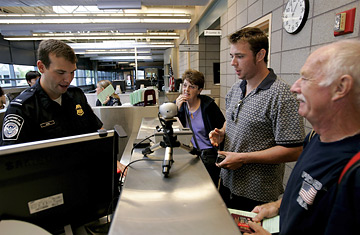
A U.S. Customs and Border Protection officer speaks with tourists entering the United States from Canada in Niagara Falls, Ontario.
Starting January 31, you will no longer be able to cross into the United States without any documentation at all. Yes, that's right. Until now, believe it or not, you could come into the country from Canada with no papers — just your word that you were an American or a Canadian citizen.
If the border patrol agent believed you — based on your knowledge of the local school board politics of Flint, MI, perhaps, or maybe just that trustworthy glint in your baby blue eyes — you were in.
Now, despite furious opposition from certain border-state members of Congress and other people worried about anything that might reduce trade, the Department of Homeland Security is introducing a radical new plan.
Brace yourself: you will now need a driver's license and a birth certificate (or just a passport alone) to come into the country from Canada. If you are under 19, you will need a birth certificate.
Here to explain this revolution in homeland security is Customs and Border Protection veteran, Paul Morris.
TIME: Can you please spell your name for me?
Morris: Paul like the pope and Morris like the cat.
TIME: How long have you worked on the border?
Morris: I've worked for border agencies for about 20 years. I started out as a border patrol agent in Texas. I spent four years on the Canadian border, the last two years from 2004 to 2006. Now I manage all the policies and programs around admissibility in Washington, DC.
TIME: I think most Americans would be surprised that until now, people didn't necessarily need any documents at all to cross into this country. What do you think of the changes?
Morris: The new requirements are I believe long overdo. On the southwest border, the majority of those crossing are Mexican citizens, and the statute has always required a passport or visa or border-crossing card, for as far as I know at least since the 1950s. For the Canadians though, there's always been an exemption built into our statute.
TIME: Before this, there were some 8,000 different documents people could legally use to cross the border. That's a lot. Can you give me some examples?
Morris: The lowest requirement was that Canadian and U.S. citizens can make an oral declaration.
TIME: What is an oral declaration?
Morris: It basically means that they can simply state that they're a United States citizen or a Canadian citizen. That is a fairly low bar.
TIME: What percentage of people used oral declarations?
Morris: It's a very small percentage. Usually the minor children traveling with Mom and Dad.
To a great extent, the traveling public is already compliant. Although they may not be used to presenting these documents, in general they do possess them.
TIME: OK, let's talk about some of these 8,000 documents you could use if an oral declaration wasn't convincing. What are some examples?
Morris: A baptismal certificate from your church in rural Nebraska, a copy of a birth certificate issued by a hospital in California, a student ID card issued by a local college.
TIME: What's the strangest argument or document you've ever come across from someone trying to cross the border?
Morris: Fantasy documents.
TIME: What is that?
Morris: Documents manufactured by a company not meant to legally convey any kind of citizenship but they appear to be a driver's license. They are sold as mementos, novelty items.
TIME: What kind of place would sell them?
Morris: You can get them on the Internet.
TIME: I'm thinking about what's in my wallet. Did anyone ever try to give you a Blockbuster video card?
Morris: Sometimes we have to rely on a Blockbuster card. Let's say you question whether someone is really a United States citizen. They've got a driver's license and a Blockbuster card and a library card and something else. A Blockbuster card may actually help.
You need a driver's license and a credit card to get a Blockbuster card. So Blockbuster may have actually had more stringent requirements than our border.
TIME: That's scary.
Morris: Why do you think we didn't require any standard documents until now? How do you explain that, when so many people in other countries carry passports or national ID cards, and it's no big deal?
Morris: I think we thought we were safe from the rest of the world. That we were untouchable perhaps. And I think to a great extent some of the public continues to choose to think that, regardless of what happened on September 11.
America has never recovered the level of foreign tourism it had before 9/11. A recent Sunday Times of London article complained about the long lines at immigration and "thin-lipped questioning from aggressive border guards." The article called on Brits to consider "other more welcoming holiday options. Such as Iran or North Korea."
TIME: You are an ambassador for the country, in addition to a law enforcement officer. What do you think we need to do better?
Morris: I firmly believe that it is simply a perception. We definitely need to do a better job in educating the international traveler about our processes and insuring that they understand that we are a welcoming nation. There has been a groundswell of media that has latched on to individual cases, but close to 100% of people are processed quickly, without incident.
More than 400 million people a year come to this country. We are certainly going to have moments when we have to take people into custody or do a more thorough search and ask additional questions, and it won't be necessarily a pleasant situation, but that's part of the process.
